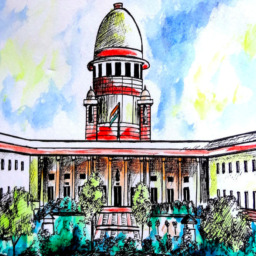Introduction
The power of Royal Prerogatives is one of the essential sources of the British Constitution. Formerly Royal prerogatives originated as the sole power of the Monarch. However, over time, the British Monarchy system has lost the majority of its powers. Now absolute Monarchy of the U.K. Government only exists in theory. In practice, there is limited monarchy present in all three branches of the Government. In fact, at present, the Monarch is the nominal head of the Government[1]. All functions of the Government are exercised in the name of the King or Queen by the Parliament, Cabinet, and Judiciary.
The Royal Prerogative is a body of customary authority, privilege, and immunity[2]. A.V. Dicey defined Royal Prerogative as “Every act which the executive government can lawfully do without the authority of an Act of Parliament”[3]. This denotes that any action of the government by the Monarch without the authority of a Statute is done under the authority of the Royal Prerogatives.
The definition of the Royal Prerogatives was recognized by the Courts in two cases. In R v Secretary of State for the Home Department, ex parte Northumbria Police Authority[4], it was held that prerogative power includes the power to take all the necessary steps to preserve the Queen’s peace[5]. In Burmah Oil Co. v Lord Advocate[6], the House of Lords opined that prerogatives are all those things in an emergency required for the conduct of the war[7]. As now the Monarch enjoys very limited power, he/she cannot claim any prerogative power which is contrary to (i) common law, (ii) any statute and (iii) the freedom of the citizen[8].
Contents
Royal Prerogatives can be divided into 2 classes. (i) Personal Prerogatives and (ii) Political Prerogatives. Political Prerogatives can further be divided into 3 classes. These are (i) Administrative, (ii) Judicial (iii) Legislative, (iv) Foreign and (v) Others.
Personal Prerogatives
The Personal Prerogatives of the Monarch are:
- The King can do no wrong. This prerogative establishes that no civil or criminal proceeding is maintainable against the Monarch in person. Furthermore, this prerogative demonstrates ministerial liability. It denotes that no one can plead the orders of the crown in defence of any Act which is not justifiable by law.
- The King never dies. This prerogative demonstrates that the Monarch always exists, only the person is changed.
- In a conflict between the right of the King and that of the subject, the right of the King shall prevail.
- The King is not bound by statute unless it has been clearly expressed by the Statute.
- The King is never an infant.
Political Prerogatives
Among the Political Prerogatives, the Administrative Prerogatives are:
- Appointment of Ministers: In theory, the Monarch may appoint anyone as the Prime Minister and other Ministers of the Cabinet by the virtue of Royal Prerogatives[9]. However, in reality, The Monarch can only appoint the leader of the majority party as the Prime Minister. This Practice has been established by convention.
- Appointment of the Government officials and other civil services: The Royal Prerogative also authorizes the Crown to appoint the members of government officials and other civil services[10]. The Crown is also the Head of the army, navy, and air force[11]. This prerogative also empowers the Crown to recruit members of the armed forces, appoint commissioned officers, and make agreements with foreign governments to send troops in their territory.
Legislative prerogatives
Legislative prerogatives of the Monarch are:
- Summoning and dissolution of the parliament. However, this action shall be carried with the consent of the Ministers. If the Crown summons or dissolves the parliament without the consent of the Minister, such action will be unconstitutional but legal[12]. The Royal Prerogative to dissolve the Parliament has been abrogated by the Fixed-term Parliaments Act, 2011.
- Giving Royal assent to the bills is another prerogative power of the Crown. A bill cannot become an act without Royal assent. Generally, the Crown always gives assent to the Parliamentary bills as this practice has been established by convention. The last time the Crown did not give royal assent was three hundred years ago in 1704 by Queen Anne[13].
- The Crown also creates peers in the House of Lords on the advice of the Prime Minister.
Judicial Prerogatives
The Crown is the fountain of justice and the guardian of peace in the United Kingdom. The Crown exercises some judicial prerogative powers which have been recognized by the Court of law.
Judicial Prerogatives of the Crown are:
(i) Prerogative of mercy is the most eminent judicial power of the Crown. There are two types of prerogative of mercy. (i) the granting of pardons and (ii) granting of nolle prosequi.
(i) Granting of pardons can be with or without any condition. This right is now exercised by the Crown on the advice of the Home Secretary[14]. Pardon eliminates all the pains and punishments from criminal offences[15]. It was held in the case of Council of Civil Service Unions v Minister for the Civil Service[16] that pardons are subject to judicial review.
(ii)Granting of nolle prosequi means to stop legal proceedings against a person. However, this does not mean acquittal. The defendant can be brought before the courts again on the same charge at a later stage. This power is exercised by the Attorney General of England and Wales in the name of the Crown[17].
Foreign Prerogatives
The Monarch uses most of its prerogative power in the foreign sector. The Crown is the sole representative of the nation in national and international affairs[18]. Some of the Foreign Prerogative powers are making treaties, ceding territory, making war and peace, recognizing the status of a foreign country, appointing and receiving representatives of his/her territory or abroad etc[19].
Other Prerogatives
Apart from the above-mentioned powers, the Crown enjoys some more additional powers. These are:
The Crown nominates the bishops of the Church on the advice of the Prime Minister[20]. Granting of awards is another such prerogative although this power is also exercised on the Advice of the Executive. However, there are some awards such as Order of Merit, Order of the Garter, the Royal Victorian Order, the Royal Victorian Chain which are decided by the Crown himself/herself[21].
Conclusion
Royal Prerogative are an important part of the British constitution. These Prerogatives refer to those powers exercised by the Monarch during the direct involvement in the Government. The majority of these powers are now exercised by the Ministers in the name of the Crown. In case The Crown does not approve the will of the Ministers, the former may be compelled to do so by an act of the parliament. Monarch now only exercises ceremonial powers.
Royal Prerogatives provide immense power to the ministers without the approval of the Parliament. These powers provide flexibility in dealing with exceptional circumstances. Prerogative powers can also be abolished by the Parliament as has been by the Fixed-term Parliaments Act, 2011. Therefore, the prerogative powers are the unique feature of the British Constitution which provides quick solutions to matters not dealt with by a statute and can also be abrogated if the powers are exercised unconstitutionally.
Author(s) Name: Gargi Das Chomok (University of Rajshahi, Bangladesh)
References:
[1] Barrister Farzana Hussain, Constitutional Law of UK & USA, 3rd Edition, Hira Publication, 2019, p.62
[2] Leander Beinlich, Royal Prerogative, Oxford Constitutional Law, Oxford Constitutional Law: Royal Prerogative (ouplaw.com)
[3] All Answers ltd, ‘The Royal Prerogative Lecture’ (LawTeacher.net, October 2021) <https://www.lawteacher.net/lectures/public-law/the-royal-prerogative/?vref=1> accessed 17 October 2021
[4] R v Home Secretary, ex p Northumbria Police Authority [1989] QB 26
[5] Ibid
[6] Burmah Oil Co. v Lord Advocate [1965] AC 75, House of Lords
[7] Ibid
[8] Ibid
[9] Ibid
[10] Note 1 p.66
[11] Md. Mostofa Hosain, Constitutional Law of UK & USA, 3rd Edition, University Publication, 2019, p.81
[12] Ibid
[13] Ibid
[14] David Malone of Red Lion Chambers and Christopher Snell of No 5 Chambers, The royal prerogative of mercy, The law Society Gazette
The royal prerogative of mercy | Feature | Law Gazette
[15] R v Foster (Barry) [1985] QB 115; [1984] 3 W.L.R. 401].
[16] The GCHQ case) [1985] AC 374, [1985] ICR 14.
[17] Note 1 p.68
[18] Ibid
[19] Note 18
[20] Note 1 p.69
[21] Ibid















